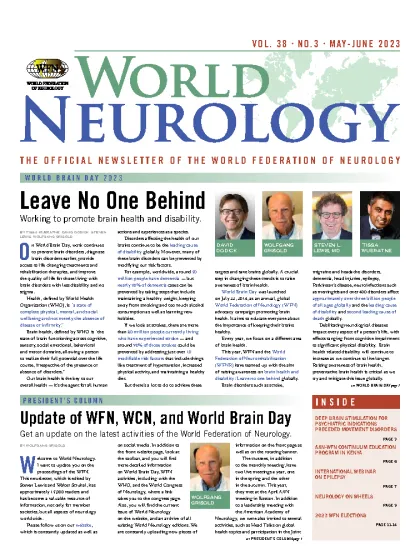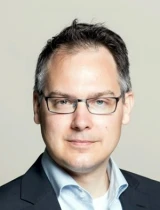Document download: World Neurology - May-June 2023

Description:
World Neurology: May-June 2023, Volume 38, No. 3
Release date: 18 Jul 2023
Published: 20 Aug 2025
Filename:
wn_may_jun23.pdf
File type and size:
pdf, 2.58 MB
View/download:
Published by Ascend Integrated Media LLC, Kansas, USA
From the editors
Steven L. Lewis, MD, Editor, and Walter Struhal, MD, Co-Editor


By Steven L. Lewis, MD, Editor, and Walter Struhal, MD, Co-Editor
We'd like to welcome all readers to the June 2023 issue of World Neurology.
The issue begins with the article and reminder by Dr. Tissa Wijeratne and Dr. David Dodick (co-chairs of World Brain Day) and Dr. Wolfgang Grisold (WFN president) and Dr. Steven Lewis (WFN secretary general) of the upcoming World Brain Day 2023, dedicated to "Brain Health and Disability," including collaborations between the WFN, our global regions, national neurologic societies, and the World Federation of Neurorehabilitation. All WFN regions, societies, and neurologists worldwide are encouraged to take part in this year's efforts.
In this issue's President's Column, WFN President Dr. Grisold updates us on the many international activities in progress with the WFN, including planning for the World Congress of Neurology in Montreal this October, World Brain Day, and many other global activities, including collaborations with the WHO and work being done in relation to the Intersectoral Action Plan (IGAP) and the UN ECOSOC among so many other ongoing collaborative WFN activities throughout the world.
In this issue's History Column, Dr. Peter J. Koehler details the history of brain stimulation for psychiatric disorders, which he notes preceded the development of this modality for movement disorders. Dr. Massimo Leone next describes an important collaborative educational effort to improve treatment of epilepsy in sub-Saharan Africa, helping fulfill the promise of IGAP.
Dr. Bindu Menon and Dr. Medha Menon provide a well-illustrated report on their remarkable outreach program to improve the health of the patients in Nellore, Andhra Pradesh, India. Dr. B. Jeanne Billoux and Dr. Avindra Nath next provide a timely update of several current and emerging topics in neuroinfectious disease. Dr. Rabwa Fadol then reports on her experience in Sudan as a recipient of a grant to participate in the EEGonline Distance Learning Program created by Dr. Lawrence Tucker and colleagues in Cape Town.
Dr. Dilraj Singh Sokhi next reports on the highly successful Continuum program in Kenya, one of many worldwide examples of this successful collaborative effort between the AAN, the WFN, and our member societies.
Dr. Vladimir Hachinski, a WFN past president, provides a personal and heartfelt obituary on Dr. James F. Toole, WFN president from 1997-2001, who passed away in 2021.
The issue ends with the report from the WFN Nominations Committee regarding the nominating committee's recommended candidates for the positions of WFN Treasurer and WFN Elected Trustee (followed by the statements from these candidates); the nominating committee report also provides a description of the method by which additional nominations can be made.
In closing, we want to again thank all readers for their interest in and attention to World Neurology and the privilege to report such important updates about neurology and neurologists from around the globe. We look forward to celebrating World Brain Day soon after this issue is published, and to seeing many of you at the WCN in Montreal (in person or virtually) this October! ■
Highlights
President's Column
-
Update of WFN, WCN, and World Brain Day ⧉
By Wolfgang GrisoldI want to update you on the proceedings of the WFN. This newsletter, which is edited by Steven Lewis and Walter Struhal, has approximately 15,000 readers and has become a valuable resource of information, not only for member societies, but all aspects of neurology worldwide. The trustees, in addition to the monthly meeting, have two live meetings a year, one in the spring and the other in the autumn. This year, they met at the April AAN meeting in Boston.
The WFN Committees and Specialty Groups
-
Neuroinfectious Disease Update ⧉
By B. Jeanne Billioux, MD, and Avindra Nath, MDThe WHO has recently released reports denoting the expansion of cases of dengue and chikungunya beyond historical areas of transmission in the Americas, as well as warnings for increased expansion of transmission in areas of Europe that were previously unaffected. Climate change may contribute to broadening habitat for certain viral-spreading arthropods, including the Aedes aegypti mosquitoes that harbor dengue, chikungunya, and zika viruses.
-
2023 WFN Elections - Report of the WFN Nominations Committee ⧉
One Treasurer and one Elected Trustee are to be elected at the Council of Delegates (CoD) Annual General Meeting (AGM) in October during the World Congress of Neurology in Montreal. The nominating committee of the World Federation of Neurology (WFN) now recommends to the membership those listed here as candidates in accordance with the Federation's Memorandum and Articles of Association.
From WFN
-
World Brain Day 2023 - Leave No One Behind ⧉
By Tissa Wijeratne, David W. Dodick, Steven Lewis, and Wolfgang GrisoldOn World Brain Day, work continues to prevent brain disorders, diagnose brain disorders earlier, provide access to life-changing treatments and rehabilitation therapies, and improve the quality of life for those living with brain disorders with less disability and no stigma.
-
AAN-WFN Continuum Education Program in Kenya ⧉
By Dilraj Singh SokhiThere are less than 20 neurologists in Kenya, yet this number is significantly more than neighboring countries, and enough to comprise a national professional organization. The Neurological Society of Kenya reinvigorated its education and advocacy mission in 2019 by launching the first series of educational lectures for the neurologist and general physician practicing in the region. But questions arose about which topics to cover, in what order, and how to ensure up-to-date information was being disseminated. The most appropriate solution that addressed these concerns was to refer to the Continuum series, delivered to us from the AAN-WFN Education Program, and follow the topics contemporaneously. And so, we had talks delivered by regional and international experts on dementia, epilepsy, multiple sclerosis, headache, and neuromuscular disease. The respective copies of the journal were also shared with attendees during each event.
Around the World
-
International Webinar on Epilepsy ⧉
By Massimo LeoneThe Intersectoral Global Action Plan (IGAP) on epilepsy and other neurologic disorders is the WHO's neurology revolution calling neurologists and other stakeholders to become partners in order to contribute to improving access to care to people living with epilepsy (PLWE) and other neurologic disorders, particularly in geographic areas with poor access to care as sub-Saharan Africa (SSA).
-
Neurology on Wheels ⧉
By Dr. Bindu Menon MD, DM, and Dr. Medha Menon, MBBSAs goes the epidemiological transition from communicable to non-communicable diseases (NCDs), India stands at the precipice of having to balance the burden of both. While managing communicable diseases like a wound that has not yet scabbed, the rising trends of NCDs like stroke, cardiovascular events, and cancers further predispose the population to infections, making them difficult to curb.
-
My Experience With the EEGonline Distance Learning Program ⧉
By Dr. Rabwa FadolMany thanks to Dr. Lawrence Tucker and his team for organizing the online 2022 EEG course and to the World Federation of Neurology (WFN) for sponsoring me as a junior neurologist for such an outstanding course. It is so valuable, informative, and well organized.
History
-
Brain Stimulation for Psychiatric Indications Preceded Movement Disorders - A historical sketch. ⧉
By Peter J. KoehlerMost neurologists are probably unfamiliar with the history of deep brain stimulation (DBS). Although Parkinson's disease (PD) is probably the best-known indication, several refractory psychiatric disorders may be treated by DBS. Obsessive compulsive disorder (OCD) and depression may be mentioned with this respect. A recent dissertation from the University of Utrecht, Netherlands, by psychologist Max van der Linden shows that research in this field had already started in the 1950s.
In Memoriam
-
James F. Toole: Stroke Pioneer, Educator, and President Multiplex (1925-2021) ⧉
By Vladimir Hachinski, CM, MD, DSC, FRCPC, FCAHS, FRSCWe met by mail. He asked me to contribute a chapter on the cerebral circulation to his multiedition cerebrovascular diseases book. I felt honored. We became friends, and much later, I was the coordinator of Canadian Centers for his landmark Asymptomatic Carotid Stenosis Study (ACAS).








